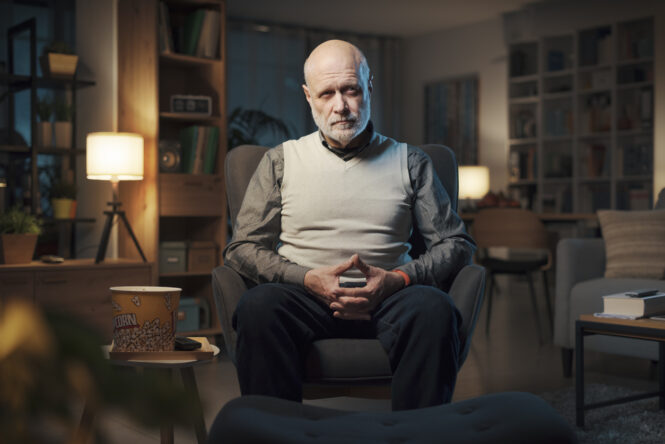Loneliness is more than just being physically alone; it’s feeling unseen, disconnected, or separate, even in a crowd.

For people who have lived with chronic loneliness, certain beliefs can take root as time goes on. These thoughts feel real because they were shaped by painful experiences, but often they’re not actually true. They’re protective walls that end up making real connection even harder to find. Here are some of the things people who’ve been lonely most of their lives often mistakenly believe, and why it’s worth gently questioning them.
1. “Nobody really wants to know the real me.”

When you’ve spent years feeling invisible or misunderstood, it’s easy to believe that opening up is pointless. You start to assume that if people knew the full truth about you — your fears, your quirks, your dreams — they’d walk away.
Of course, the reality is, the right people crave realness. They’re not looking for perfection; they’re looking for authenticity. Being your true self is risky, but it’s the only path to real connection, and the people who matter will move closer, not further away.
2. “Everyone else has it all figured out.”

Scrolling through social media, hearing friends’ highlight reels — it can seem like everyone else is surrounded by love, laughter, and community. Meanwhile, you feel stuck outside, looking in. However, loneliness touches more people than you realise. Many are hiding their own disconnection behind polished smiles. You’re not as alone in your loneliness as you might think, and there’s no shame in feeling it.
3. “If I have needs, I’m a burden.”

People who have been lonely for a long time often believe that needing support, comfort, or understanding makes them “too much.” So they bury their needs deep, trying to stay low-maintenance to avoid scaring people away. The thing is, real relationships are built on mutual needs. Healthy people don’t see your need for connection as a burden; they see it as part of what makes you human, and part of what deepens intimacy over time.
4. “It’s safer not to get my hopes up.”

When loneliness has been your constant companion, hope can start to feel dangerous. Why risk believing that something better is possible, only to be let down again? The problem is, guarding your heart too fiercely often locks out the very experiences that could heal you. Hope hurts sometimes, yes, but it’s also the bridge to new beginnings, even if it feels wobbly under your feet at first.
5. “People only care when they need something.”

If you’ve been used, overlooked, or taken for granted in the past, it can twist your view of relationships. You start to expect that people’s kindness is just a setup for future demands. Of course, not everyone operates on hidden agendas. There are people out there who offer care freely, not because they want something in return, but because connection matters to them too.
6. “I have to be perfect to be loved.”

Chronic loneliness sometimes grows alongside perfectionism. You start believing that if you could just be more impressive, more polished, more successful, then people would finally stay. But true connection doesn’t come from impressing other people. It comes from vulnerability—from showing your messy, real, unfinished self and finding that someone else chooses you anyway.
7. “It’s too late for me to find my people.”

After years of loneliness, it can feel like the ship has sailed, that everyone else built their friendships and relationships long ago, and you missed your chance. However, real connection has no expiration date. People find new friendships, new communities, even new love at every stage of life. It’s never too late to begin again, and sometimes, the connections you build later are deeper and more meaningful because you know what you’re looking for now.
8. “If someone really cared, they would just know.”

It’s easy to slip into magical thinking, believing that if people truly cared, they’d sense your loneliness without you having to say anything. The truth is that relationships aren’t mind-reading exercises. Often, the bravest, most important step is letting people know you need connection. Speaking your needs out loud isn’t weakness, it’s courage, and it gives people the chance to show up for you in ways they otherwise might not have known how to.
9. “Reaching out makes me look desperate.”

When you’ve felt rejected before, reaching out can feel like admitting failure, like waving a flag that says, “I’m needy.” So you stay silent, even when you’re craving connection, even though reaching out is actually a strength. It shows that you value connection enough to fight for it. People who are worth having in your life will see your efforts as brave, not pathetic.
10. “Once you’ve been lonely this long, it’s who you are.”

Loneliness can start to feel like part of your identity, like an immovable fact about yourself rather than a season or a circumstance. You stop seeing it as something that could change. Loneliness isn’t who you are, though. It’s something you’ve experienced. And experiences — even painful, long ones — don’t define your entire future. Change, slow and fragile as it can be, is always possible.
11. “I must be unloveable if I’m still alone.”

It’s one of the cruellest lies loneliness tells: that your relationship status or social circle size reflects your value as a person. That if you were better—smarter, prettier, funnier—you wouldn’t be alone. However, loneliness is often about circumstance, timing, or past hurt, not about your inherent worth. Being loveable has never been the issue; being seen by the right people is the journey you’re still on.
12. “Getting hurt again would be worse than staying lonely.”

If you’ve been hurt before — ghosted, betrayed, rejected — loneliness can start to feel safer than risking fresh wounds. Why open the door if it might just slam shut again? The truth is, loneliness is a slow, quiet kind of pain too. And while opening up does carry risk, it also carries possibility — of friendships, of laughter, of being truly understood in a way that loneliness never offers.
13. “I’m better off not needing anyone.”

When connection feels out of reach for long enough, it’s tempting to decide you don’t need it at all. Independence becomes a shield, a way of protecting yourself from more disappointment. Needing people isn’t a flaw, however. It’s part of being human. You’re wired for connection, not as a weakness, but as a birthright. Allowing yourself to hope again, to reach again, to need again is where healing begins, even if it’s scary at first.




